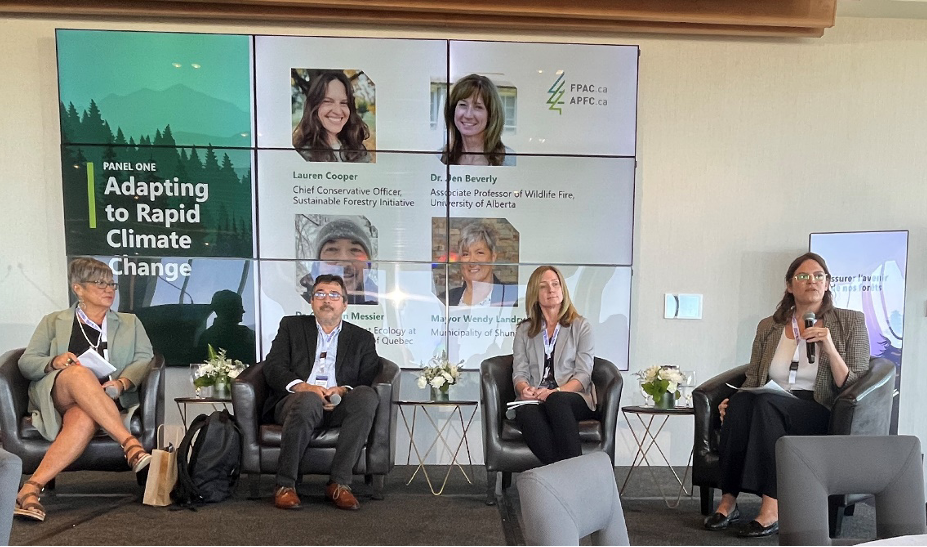By Lauren Cooper, Chief Conservation Officer at SFI
The world has woken up to the urgent need for climate action and the critical role of nature-based solutions in mitigating and adapting to climate change. This transformational shift signifies a broader global recognition of the importance of forests and other natural systems in addressing the climate crisis. I had the opportunity to be part of this transformational shift recently at two major events in the same week: Canada’s National Forest Week and Climate Week NYC.
Both events explored and formalized the essential role of forests and nature-based solutions in the fight against climate change. The discussions covered hot topics such as how carbon credits can encourage and reward climate-beneficial behaviors while underscoring the pivotal role of forests in mitigating climate change. The power of nature-based solutions was accentuated by discussions pointing to how they provide multiple co-benefits, including cleaning the air, encouraging social justice, and enhancing biodiversity.
Canada’s Forest Week: Embracing Climate-Smart Forestry
Canada’s Forest Week offered a unique opportunity to engage in climate-smart forestry dialogues. One standout moment for me was the opportunity to moderate the panel “Adapting to Rapid Climate Change” at the Forest Products Association of Canada (FPAC) National Forest Week celebration in Ottawa. Forest adaptation to rapid climate change was a major focus, which perfectly aligns with the climate-smart forestry and fire resiliency and awareness objectives of the of the SFI 2022 Forest Management Standard. The standard builds on the fact that forests and the forest sector play a significant role in climate change mitigation through the capture and storage of carbon dioxide (CO2) in forests and wood products, as well as through material and energy substitution.
The diversity of voices on the panel fostered a rich and engaging dialogue that emphasized the importance of preparedness in facing the challenges of a changing climate. The panelists discussed how climate-smart forestry can increase climate benefits from forests and the forest sector in ways that create synergies with other needs related to forests. The panel also examined the role forests play in reducing and removing greenhouse gas (GHG) emissions, and what’s happening on the ground to adapt and make Canadian forests more resilient to a rapidly changing climate.

FPAC Adapting to Rapid Climate Change panel: Wendy Landry, Mayor of the Municipality of Shuniah in northwestern Ontario, Dr. Christian Messier, Professor of Forest Ecology and Urban Forestry. Université du Québec, Dr. Jen Beverly, Associate Professor, Department of Renewable Resources, University of Alberta, and Lauren Cooper, Chief Conservation Officer, SFI
Climate Week NYC: Uniting for Nature-Based Solutions
Climate Week NYC brought a new perspective to the bustling city, along with renewed focus on climate change and nature-based solutions. I was so pleased to be included in the invitation-only event “Forest Carbon Markets: Building a Trusted Marketplace.” Attendees witnessed the convergence of thinking of key stakeholders from Weyerhaeuser, Voluntary Carbon Markets Integrity Initiatives, Carbon Direct, and JPMorgan Chase & Co. This convergence demonstrated a growing interest in understanding how forest carbon dynamics relate to climate-beneficial behaviors.
Another crucial theme that emerged was the ability of climate finance to support good forest management practices on the ground. Climate finance and sustainable forest management can go hand in hand, providing opportunities for landowners to make environmentally and economically sound decisions.
Forests Take Center Stage with Certification as a Key Component
As a member of the SFI team, I was especially encouraged to see how sustainable forest management certification was repeatedly emphasized as a tool that bridges the gap between science and practice. Forest certification was linked to quality assurance for carbon market investors and SFI standards were specifically praised for their role in interpreting good practices for climate benefits, exemplified by the climate-smart forestry objective in the SFI 2022 Forest Management Standard.
Certification was also featured as a foundation for carbon projects, such as the Maine Carbon Project by Weyerhaeuser. The American Carbon Registryrecently approved Weyerhaeuser’s Improved Forest Management carbon credit project, which covers about 50,000 acres and issued the company’s first credits on the voluntary carbon market. Over the lifetime of the project, it is expected to generate 475,000 credits, equivalent to removing 475,000 tons of CO2 from the atmosphere. These lands are also SFI certified sustainable under the Forest Management standard. Forest certification provides the baseline sustainability assurances and adds credibility to initiatives aimed at measuring and enhancing carbon benefits like Weyerhaeuser’s Maine project.
Our Shared Future
The transformational dialogues at Canada’s Forest Week and Climate Week NYC highlighted the growing recognition of the pivotal role of nature-based solutions in addressing climate change. As we look to the future, it’s clear that forests and other natural systems will be crucial in our collective efforts to combat the climate crisis. It’s not just about protecting our forests; it’s about something even bigger— securing our planet’s future.

Ara Erickson, VP, Corporate Sustainability, Weyerhaeuser, Jad Daley, President and CEO, American Forests, and Lauren Cooper, Chief Conservation Officer, SFI, at Climate Week NYC
